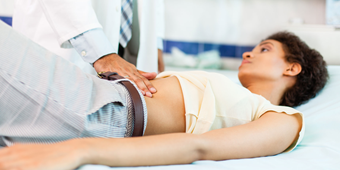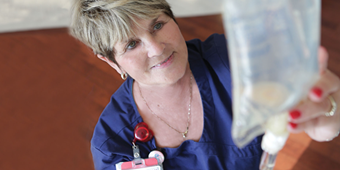Tactics to Tame Treatment Side Effects

Answer a few questions and we'll provide you with a list of primary care providers that best fit your needs.
When you’re facing breast cancer treatment, chances are you’re as concerned about your cancer symptoms as you are about treatment side effects. Start by talking to your doctor about the side effects that occur most often with your treatment and what you can do to manage them.
Appetite Changes
Eat well during cancer treatment, and you’ll feel stronger, more active and better able to resist infection. You need more protein than usual, and a healthy diet high in protein helps build and repair tissue. But treatments, especially chemotherapy, can make food unappealing or taste different. To stimulate your appetite:
- Eat foods high in protein several times a day, like dairy products, meat, fish, eggs, beans, peanut butter and nuts.
- To maintain your weight, eat high-calorie foods like margarine or butter, sugar, honey, jams, jellies, cream cheese, dried fruit, gravies, sauces, mayonnaise and salad dressing.
- Drink plenty of fluids to help control your body temperature and aid digestion. In addition to water, fruit juices and other liquids, try gelatin, pudding, soups, fruit bars and ice cream.
- Eat small meals throughout the day instead of three large ones.
- Eat with friends or play your favorite music at mealtimes.
- Eat your biggest meal in the morning, when your appetite is greatest.
- Increase your activity level, which may boost your appetite.
- On days when you don't feel like eating, don't worry. However, if your appetite doesn't improve in a few days, talk with your doctor or nurse.
- Ask your doctor for a referral to a registered dietitian if you have trouble maintaining your appetite or weight.
Bleeding
Chemotherapy may reduce your blood platelet count and lead to a problem called thrombocytopenia. Your blood may not clot as it should, and you may bleed and bruise easily. If your platelet count is low, avoid injuries that could lead to bleeding problems:
- Protect your skin from cuts and scrapes, and be careful if you use sharp objects.
- Shave with an electric razor.
- Use a soft toothbrush to prevent bleeding gums, and ask your doctor if it’s OK to floss.
- Take steps to prevent constipation, which can lead to hemorrhoids.
- Call your doctor if you develop a rash, bleeding or bruising.
Bloating
Some chemotherapy drugs cause you to retain water. The problem will stop when your treatment ends. But in the meantime:
- Ask your doctor about a diuretic or water pill if your bloating is severe.
- Take short walks.
- Elevate your legs as often as you can.
Constipation
Constipation – difficult or infrequent bowel movements – can range from mildly uncomfortable to painful. Some pain medications and hormone therapy may lead to constipation. To prevent or ease your symptoms:
- Drink 6 to 8 glasses of fluid a day, especially water and prune juice.
- Eat high-fiber foods – cereals, whole grains, and fruits and vegetables that are approved by your doctor.
- Exercise.
- Take stool softeners or a laxative only as prescribed by your doctor.
Cough
Some hormone therapies can increase coughing. To soothe your symptoms:
- Drink at least eight glasses of fluid a day to keep your throat moist.
- Use a humidifier to increase the moisture in the air.
- Ask your doctor about medicines to stop or help control coughing.
Diarrhea
Diarrhea, which includes loose and/or frequent bowel movements, can make you dehydrated. To sidestep problems:
- Avoid milk and milk products.
- Avoid gas-producing vegetables, dried fruit, fiber cereals, seeds, popcorn, nuts, corn and dried beans.
- Eat low-residue, low-fiber foods such as those found in the BRAT diet (bananas, rice, applesauce and toast).
- Increase your fluid intake – try water and broth.
- Ask your doctor about medications.
Hair Loss (alopecia)
Losing your hair can be upsetting because thinning or baldness is a visible reminder that you are being treated for cancer. Keep in mind that your hair will grow back after treatment. To cope until then:
- Consider cutting your hair short before treatment starts.
- Think about buying a wig, hat or scarf before your hair loss starts. That way, you can get a wig that matches your hair, and you'll be ready with head coverings, if you choose to use them.
- Protect your sensitive scalp with sunscreen, hats or scarves.
Hot Flashes
A hot flash is a sudden rush of warmth to the face, neck, upper chest, and back – with or without sweating. It can last from a few seconds to an hour or more. Hot flashes can occur with chemotherapy or hormone therapy. To ease your discomfort:
- Limit hot drinks, caffeine, alcohol and spicy foods.
- Avoid strenuous exercise.
- Layer your clothing so you can add or remove as needed.
- Stay out of environments with very warm temperatures.
- Use sprays or moist wipes to help lower skin temperature.
- Ask your doctor about traditional (medication/supplements) or alternative (relaxation training or acupuncture) therapies.
Infection
Many types of chemotherapy can cause low white blood cell counts (neutropenia). Because white blood cells are your body’s first defense against infection, you may not be able to put up much of a fight. If you are low on white blood cells, take these actions to stay healthy:
- Avoid crowds or people with colds.
- Wash your hands often to kill germs. Bathe daily to keep bacteria down.
- Call your doctor right away if you have any signs of infection: a temperature of 100.5°F (38°C) or higher, severe chills, a cough, pain, a burning sensation during urination, or any sores or redness.
Insomnia (Trouble Sleeping)
Insomnia can be caused by anxiety, depression or, yes, your cancer treatment. To improve your rest:
- Keep a regular bedtime schedule.
- Use your bed only for sleeping, not watching TV.
- If you don't fall asleep within 15 minutes, get up, do something else, and try again later.
- Avoid stimulants like caffeine and tobacco, especially close to bedtime.
- Don't eat, drink fluids or exercise close to your bedtime.
- Avoid long naps during the day.
Lymphedema (Swelling in Your Hand or Arm)
If lymph nodes are removed from your armpit, you may have swelling in that hand or arm (lymphedema). This is more likely if you also have radiation therapy to your armpit. Lymphedema may occur right after surgery, or can even appear years later. Notify your physician immediately if you experience any swelling. To reduce your risk or improve symptoms:
- Clean the skin of your arm daily and use moisturizing lotion.
- Wear loose jewelry and clothes.
- Carry your handbag on your other arm.
- Have your blood pressure taken on your other arm.
- Do not use tight elastic bandages.
- Do not sit in one position for more than 30 minutes.
- If you spot any signs of infection, such as redness, pain, heat, swelling or fever, call your doctor immediately.
- Do your prescribed exercises regularly. If you have swelling, keep your affected arm raised above the level of your heart, when possible.
- Keep regular follow-up appointments with your doctor.
To avoid injury and infection in your arm:
- Shave with an electric razor.
- Wear gardening and cooking gloves.
- Use thimbles when sewing.
- Take care of your fingernails. Don't cut or bite your cuticles.
- Use sunscreen.
- Clean cuts with soap and water, and apply an antibacterial ointment.
- Use gauze wrapping instead of tape; do not wrap so tightly that circulation is cut off.
- Talk with your doctor or nurse about any rashes.
- Avoid needles, like shots or blood draws, in the affected arm.
- Do not have your blood pressure taken in the affected arm.
- Avoid extreme hot or cold like ice packs or heating pads.
- Do not overwork the affected arm.
Menopausal Symptoms
Some chemotherapy and hormone therapy can damage the ovaries or trigger menopausal symptoms in younger women. You may experience hot flashes, vaginal dryness, mood swings and weight changes. Your period may become irregular or stop, affecting your ability to get pregnant. However, some women may still be able to get pregnant during treatment. To help handle your symptoms:
- If needed, talk with your doctor about birth control before treatment begins. It’s not safe to get pregnant during cancer treatment.
- Talk with your provider about ways to cope, such as using lubricants for vaginal dryness, doing mild exercise, and talking with a therapist about mood swings or depression.
- Report any unusual bleeding to your doctor.
- Continue your regular pelvic exams.
Mouth Sores (Mucositis) and Dryness
Mouth sores may hurt and make eating unpleasant. Chronic dryness can affect your ability to taste, chew and even speak. To keep your mouth comfortable:
- Brush your teeth after meals and before bedtime; floss daily if your doctor OKs it.
- Keep your mouth and lips clean and moist; try lip salves to keep your lips moist.
- Try sugar-free candies, frozen fruit bars or sugar-free gum to increase saliva.
- Sip water frequently.
- Eat soft and pureed foods that are easier to swallow.
To ease the pain of mouth sores:
- Avoid alcohol and mouthwashes containing alcohol
- Don’t eat hot, rough or spicy foods.
- Avoid tobacco.
- Ask your doctor about topical mouth medications.
- Take over-the-counter pain medication, such as Tylenol (acetaminophen), if needed.
- Call your doctor or nurse if your temperature reaches 100.5°F (38°C) or higher.
Nausea or Vomiting
Nausea or vomiting as a result of chemotherapy, radiation treatment, and sometimes hormone therapy can range from mild to severe. You may feel nauseated right after chemotherapy, or even up to 24 hours later. To prevent symptoms:
- Ask your doctor for a prescription medicine, and take as directed. If you are vomiting and cannot take the medicine, call your doctor or nurse.
- If nausea and vomiting continue even with the medication, call your provider. A different medication might help.
To help ease nausea or vomiting:
- Try foods and drinks that made you feel better when you had the flu or were nauseated in the past.
- Drink lots of fluids – six to eight glasses a day – like water, broth or sports drinks.
- Avoid fatty or fried foods, very spicy foods or very sweet foods.
- Eat foods at room temperature or cold. The smells from hot foods may make your nausea worse.
- Ask your doctor or nurse about a relaxation exercise to help you feel less anxious.
- Ask your provider about using acupressure bands on your wrists.
Nerve Damage (Peripheral Neuropathy)
If you have numbness, tingling, or weakness in your hands and feet, you may have nerve damage called peripheral neuropathy. Some types of chemotherapy can cause this. Other symptoms include ringing in your ears, or feeling too hot or too cold. Tell your doctor and follow these precautions:
- Take extra care walking and moving so you don't fall.
- Use warm, not hot, water for bathing to prevent burns. Try a shower chair or railing.
- If your daily activities become too difficult, ask your doctor for a referral to an occupational or physical therapist. They can teach you new ways of doing things to keep you active and independent.
- Be careful when driving as you may have trouble feeling the gas and brake pedals.
Avoid long daytime naps to encourage a good night’s sleep.
Pain (Including Joints, Back and Bones)
To ease pain:
- For mild to moderate joint or back pain, over-the-counter pain medication can help.
- Treat pain at an injection site with warm or cold compresses.
- Don't wait for your pain to become severe; take your pain medications regularly.
- Change your activity level. You may feel better if you rest or move more.
- Distract yourself with music, funny videos or computer games.
- Use heat, cold or relaxation techniques like yoga, meditation or guided visualization.
Pain in your Neck, Chest or Back
The removal of a breast can make your weight shift, causing you to feel off balance, especially if you have large breasts. This can lead to discomfort in your neck and back. A bra with a built-in breast, called a prosthesis, helps you look like you did before surgery, and balances the weight in your chest. If you choose a prosthesis:
- Make sure it fits properly.
- Check that the weight is similar to that of your remaining breast.
- Select a bra with a pocket to hold it so it doesn’t irritate your skin.
Sexual Problems
Hormone therapy can dampen your desire for sex. So can depression and fatigue. Whatever the source, try these coping strategies:
- Be open with your partner about any changes in your desire.
- Explore new ways to share affection and intimacy.
- Discuss sexual problems with your doctor or health care team. Ask for a referral to a counselor specializing in sexual problems.
Skin Changes
Radiation treatment can cause dry or red skin. After surgery, the skin in the breast area may also be tight, or you may feel numbness or tingling over the chest area. With chemotherapy, your fingernails may split or grow more slowly. To avoid problems:
- Protect your skin from the sun, especially between 10 a.m. and 4 p.m., by wearing sunscreen with an SPF of at least 30.
- Ask your provider to recommend a lotion to moisturize and soothe your skin. To avoid irritation, don’t use lotion, soap, deodorant, sun block, cologne, cosmetics or powder on your skin within 2 hours after radiation treatment.
- Wear loose, soft clothing over the treated area.
- Ask your nurse or doctor about exercises and tactics to manage changes in sensation, such as tightness or numbness in the chest area.
- Don't scratch, rub or scrub treated skin. After washing, gently blot dry.
- Don't bandage skin with tape. Use paper tape and ask your nurse to help you place the dressings to avoid irritation.
- Don't apply heat or cold to the treated area. Bathe only with lukewarm water.
- If you must shave the treated area, use only an electric shaver. Don't use lotion before shaving. And don't use hair-removal products.
- Keep your nails well-trimmed and clean.
Thinking Problems (Chemo Brain)
Mild problems with concentration and memory – “chemo brain” – can occur during and after chemotherapy. Fatigue can make the problem worse. To help:
- Make lists and write down important information.
- Keep organized with calendars, pill dispensers or alarm clocks.
- Ask your doctor about medications or nutritional supplements.
Tiredness
Tiredness, or fatigue, is a common side effect. Rest doesn’t always help, making it hard to do everything you want to do. Depression, pain, poor nutrition, medications and lack of sleep can all cause fatigue. Your treatment may also lead to anemia, which makes you tired because there is less oxygen in your blood. To increase your energy level:
- Take short rests when you feel tired. Avoid long daytime naps to encourage a good night’s sleep.
- Add regular exercise, such as walking, to your daily routine, with your doctor's OK.
- Balance activity with rest. Save your energy for important tasks.
- Drink plenty of fluids to prevent dehydration, which can lead to tiredness.
- Treat a poor appetite – eating improperly can make you tired.
- If your fatigue is severe or chronic, ask for help with routine tasks like grocery shopping or housework. If you work, consider reducing your hours.
- Talk with your doctor about medications or treatments to manage your anemia.
Vaginal Issues
Vaginal dryness and discharge can be bothersome side effects of hormone therapy. And lowered estrogen levels may cause some women to have vaginal thinning, causing difficult or painful intercourse. Vaginal infections may also occur more often. When you talk with your gynecologist, make sure your doctor knows you've had cancer. To ease symptoms:
- Use over-the-counter vaginal moisturizers and lubricants.
- Before sexual activity, use water-soluble lubricants or other mild vaginal moisturizers.
- Apply vitamin E oil to the area to ease irritation and burning.
- Ask your doctor about products to replace estrogen vaginally.
- Contact your doctor right away if you have a yeast infection or other unusual vaginal discharge.
- Wear cotton underwear and pantyhose with a ventilated cotton lining, and avoid tight slacks or shorts.
Weight Gain
You may find yourself gaining weight as a result of steroids or hormone therapy. If this is the case:
- Exercise daily for about 20 to 30 minutes, under your doctor's supervision.
- Eat foods low in fat, like fruit and vegetables.
- Ask your doctor to recommend a weight-management program.
Answer a few questions and we'll provide you with a list of primary care providers that best fit your needs.
Source: Premier Health




